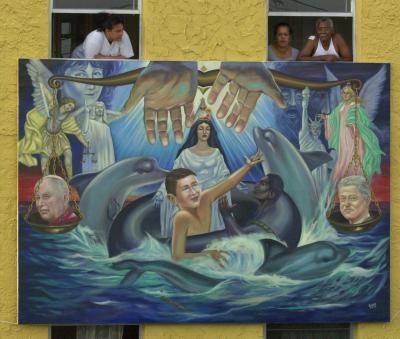Legless Cuban survivor finally reaches U.S.
After 15 years and the loss of both legs, a Cuban rafter finally arrived in Miami to tell about his harrowing escape.
BY WILFREDO CANCIO ISLA
El Nuevo Herald
ROBERTO KOLTUN/EL NUEVO HERALD
Amado Veloso Vega lost both legs to a mine as he tried to slip into Gitmo in 1992.
He had managed to crawl through the third barrier between Cuban territory and the U.S. Naval Base at Guantánamo when the warning flares lit the night sky.
Amado Veloso Vega thought he'd stay there till dawn, confident the Cuban guards could not enter the mine-laden strip dubbed ''no-man's land.'' But then he heard shots, and when he tried to move, a mine exploded, destroying his legs and flinging him 15 feet.
With no strength to shout, Veloso lay there until he heard the soldiers approach.
It was the beginning of a 15-year odyssey to get to the United States that ended this week. Veloso, 36, arrived in Miami on Monday with a U.S. State Department humanitarian visa.
Veloso is headed for Louisville, Ky., where the U.S. Conference of Catholic Bishops, which sponsored him, has found him a home.
''I'm still pinching myself, because I can't believe it. I'm in Miami!'' he said this week at his Miami hotel. ``I want to laugh because I believe I suffered enough. In Cuba, I was a walking dead man.''
The details of his horrific 1992 experience with the mine remain vivid today. ''Strips of flesh dangled from my legs. I was disfigured and my mouth was torn,'' he recalled. ``I couldn't react, though I didn't lose consciousness altogether.''
He'll never forget one man and what he said. Vega, a short man in uniform, told another that Veloso ''wouldn't make it alive'' to the hospital in Guantánamo.
''They started to play with me. They bayoneted me in the hand and in the leg and then pulled me off the fence,'' Veloso said, showing his scars.
Veloso was taken directly to the morgue. There, a doctor wouldn't give up, injecting him with adrenaline. Veloso was revived.
He slowly returned to health, but his nightmare wasn't over. For the attempted escape, Cuban authorities sentenced Veloso to two years of detention at his Havana home. A mystery remains: The mine that did so much damage was in Cuban territory, but at the time, some U.S.-planted mines were in the area, too.
Veloso said he tried to remake his life but that even relatives and friends turned their backs on him. He sought prosthetic legs at a Havana hospital. ``They concluded that my accident was due to my attempt to leave the country illegally and told me the [prostheses] they had were for revolutionaries and fighters back from Angola.''
Then he met activist Francisco Chaviano -- now a political prisoner in Cuba -- who arranged for the Cuban American National Foundation to send him a wheelchair. The chair was presented to Veloso in the name of Jorge Mas Canosa, the organization's founder. Veloso and a medical specialist friend fashioned a pair of plaster prostheses.
Early in 1994, Veloso applied for a refugee visa at the U.S. Interests Section in Havana, but he says the office turned him down. He then wrote to U.S. Rep. Ileana Ros-Lehtinen, who answered his letter and agreed to support his application, as did Rep. Lincoln Díaz Balart.
The association with Miami exile politicians caught the attention of the Cuban government. 'State Security constantly visited my home. `Who are you? First, Mas Canosa. Then, Ros-Lehtinen and Díaz-Balart. What are you up to?' they would ask me,'' Veloso said.
During the 1994 Cuban rafter crisis, Veloso tried to escape on a makeshift boat, but he was caught. Ensuing attempts failed as well.
``I lost track of all the arrests and fines. Something compelled me to look for what I couldn't find in Cuba: respect for a human being, respect for life and the right to overcome my handicap.''
In September 2006, during the police raids that preceded the Summit of Non-Aligned Countries in Havana, Veloso made his final attempt to flee. With 15 others he bought a homemade boat made of aluminum tubes. Police intercepted the others before they arrived at the beach, so he decided to travel alone from Cajío Beach in Havana.
'The boat was known as a `tube of toothpaste.' They are made of six aluminum tubes and cost about $4,000,'' he said.
The U.S. Coast Guard intercepted him 27 miles from the Mexican island of Cozumel and sent him to the place that reminded him of his personal tragedy: the U.S. Navy base at Guantánamo.
There he remained for nine months, working as a bowling alley assistant. Part of the money he earned he sent to his mother, wife and two children who remain in Cuba.
''That people would risk their lives, like Amado did, that they would risk everything, clearly demonstrates the desperation of Cubans on the island,'' Ros-Lehtinen, R-Miami, told El Nuevo Herald on Tuesday.
Today Veloso wants to place flowers on Mas Canosa's grave. ''When I look at it from afar, I feel it was worth it,'' he said of his odyssey. ``It's a high price, but it's the price of liberty.''
wcancio@elnuevoherald.com





